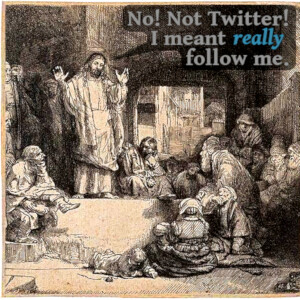


What kind of faith saves us? There are simply too many conflicting answers!
A number of factors have distracted us from the simplicity of the Gospel. Our Christian institutions, our denominations, our desire to systematise belief, our theological arguments, our desire to delineate those who are 'in' versus 'out'.
As a result, we have got to a position where we think that to be saved, it is essential to believe certain things about Christianity. For example, the precise nature of Jesus Christ, how he was miraculously conceived, how he died or came back to life. Or whether God is a trinity or a unity. Or whether the Holy Spirit has a personality, a separate identity. Or whether Mary has a special place in heaven, or whether we should pray for those who have died. We think that the holding of certain things as 'facts' constitutes the kind of belief that saves. Then to ensure that we are very precise about being correct in our own view, we frame 'statements of faith' and make people sign on the dotted line.
What Is The Kind Of Faith That Saves
However we put together our own personal grab-bag of 'facts', it is evident that our salvation cannot be dependent on that. It is not about believing information, it is about trusting a person. To be saved, we must trust Jesus to take care of us, as we risk everything in following him. We know the path he trod, and where it led. So we acknowledge that to follow him is to risk the loss of everything we hold dear, it is to lay down our own self interest, trusting that Jesus has our interest at heart. That is the belief that enables God to save us.
Degrees Of Salvation?
In the parable of the sower, there was a huge variability on the productivity of the ground. Although each patch received the same seed, some produced over three times more than others. In the parable of the talents, the master receives a variety of returns on his investment. Consequently, he rewards the servants differently. These are not peripheral details in these parables, they are the main point. Jesus taught that the end result for some, would be far more productive than for others.
The Great Divide
The most startling parable which emphasises the great divide is the parable of the sheep and goats. At the final judgement, the sheep are invited into the life of that next age, and the goats are sent to the place of weeping and wailing of that next age. And as the singer Keith Green pointed out, the difference between these groups was based on what they did and didn't DO!
Where does this leave 'salvation by faith alone'? Well, it's easy of course, if you recall that by faith, we are talking about trust; a trust that knows God has it all in hand, and he can carry us; a trust that feels totally secure within the Father's grasp. That kind of faith enables us to confidently lay down our own interests, and attend to the interests of others. The serving sheep evidenced their trust by their actions.
The Punishment
In the parable of the lazy servant, the master first cuts him in pieces, then beats him. Presumably neither punishment is actually literal, since the first would make the second rather pointless! But nonetheless the punishment is both unpleasant and destructive. In the parable of the unforgiving servant who is thrown into jail because of an unpaid debt, he is tortured until he has repaid the last penny. This time it is unpleasant, protracted, but there does appear to be restitution of some kind.
In the parable of the faithless house-manager, who assumes his master won't return, and starts beating the servants, he is assigned a place with the unbelievers. So although he was part of the household, he gets punished along with those who weren't. A sheep among the goats, if you will! At which point Jesus declares that for some in that group, there will be a smaller punishment (few blows) and for some there will be a greater punishment (many blows).
Where Are We?
So far, we have a group who are experiencing the life of the new age (not to be confused with the new age movement originating in 1960's California). And some of them are experiencing more and some of them are getting less. Some are the "greatest' and some are the "least'. And then we have a group who are experiencing punishment, again some greater and some less.
So What's The Problem
As we can see, this doesn't fit well with accepted evangelical teaching. That states that a relatively small finite sin, against an infinite God, requires an infinite punishment (hence unending hell). And the idea of a sheep temporarily among the goats is way beyond the pail!
The Problem Is Two-fold.
Firstly, we have inherited a picture of heaven and hell from a massively corrupt organisation calling itself a church (within which was both sheep and wolves) which exercised power over the masses by fear, running a trumped-up hellish protection racket by selling relics as get-out-of-purgatory-free cards! And they created a hugely complex grading structure, categorizing sins and penances into a machinery which they operated for their own benefit.
Secondly, while the protestant reformation rightly saw the whole complex racket as abusive, they simplified the five separate bible concepts of sheol, hades, gehenna, tartarus and the lake of fire, into one easily accessible idea - hell. That simplification was ratified by significant and widespread mistranslation, into the King James bible, forming the opinions of multiple generations. Control by fear was just too effective to give up!
What Of The Future
In recent years, christians across the spectrum, reformed, charismatic, protestant, roman catholic, are trying to honestly dig in to the text of the bible and questioning their inherited beliefs about hell. The emerging picture is far more nuanced, and ambiguous. If we find ourselves to have been consistently misrepresenting the God who is love, with whom nothing is impossible, in a matter so serious as undending unbearable torture for 95% of the world's population, that will not be a small thing. We would be well advised to be a bit less certain of our tabloid simplifications, and more attentive to what Jesus actually said.

